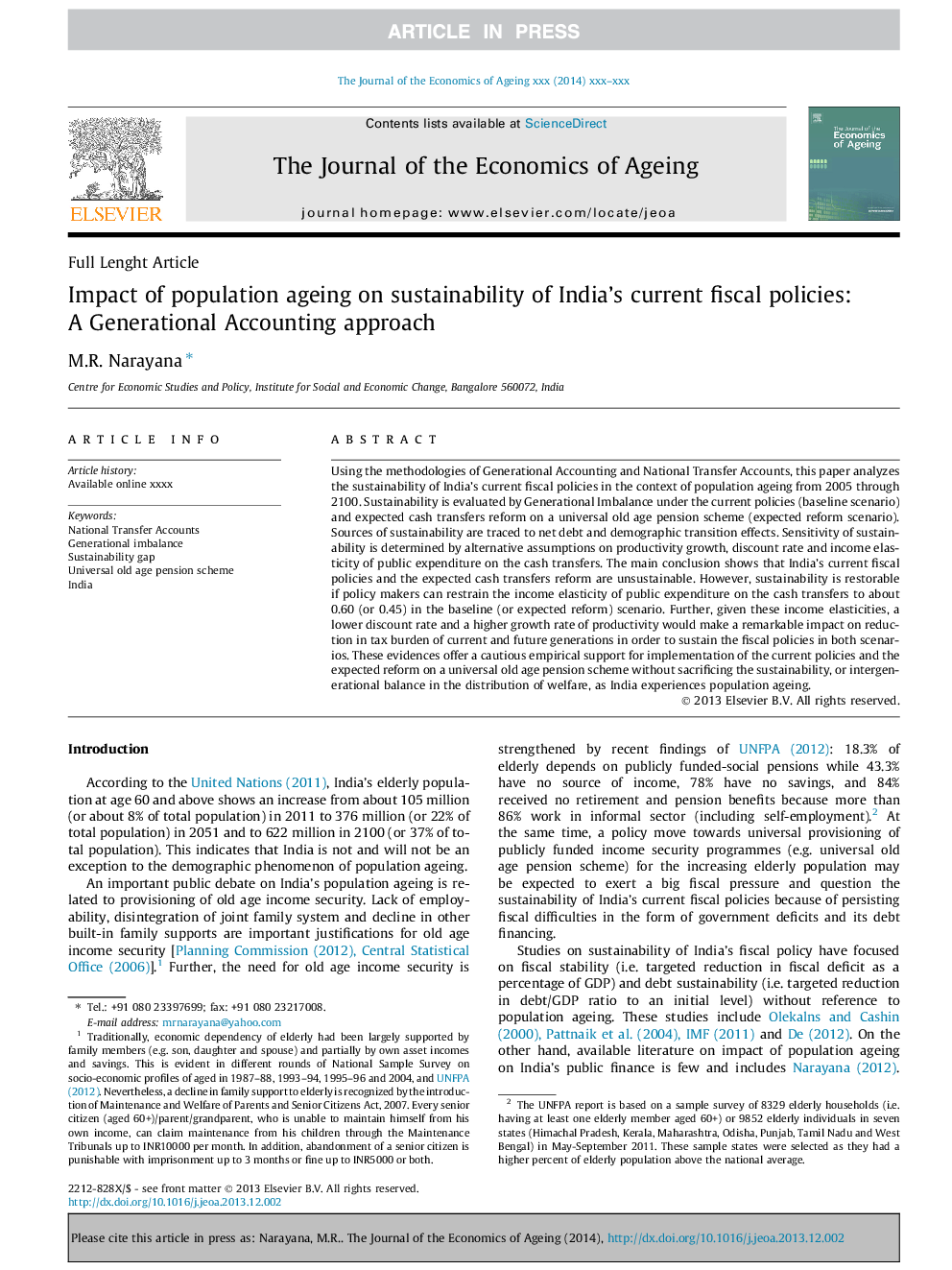| کد مقاله | کد نشریه | سال انتشار | مقاله انگلیسی | نسخه تمام متن |
|---|---|---|---|---|
| 7360084 | 1478772 | 2014 | 13 صفحه PDF | دانلود رایگان |
عنوان انگلیسی مقاله ISI
Impact of population ageing on sustainability of India's current fiscal policies: A Generational Accounting approach
ترجمه فارسی عنوان
تاثیر پیری جمعیت بر روی پایداری سیاست های مالی فعلی هند: رویکرد حسابداری نسلی
دانلود مقاله + سفارش ترجمه
دانلود مقاله ISI انگلیسی
رایگان برای ایرانیان
کلمات کلیدی
حسابهای انتقال ملی، عدم تعادل نسل، شکاف پایداری، طرح بازنشستگی سنای جهانی، هند،
ترجمه چکیده
با استفاده از روش های حسابداری نسلی و حساب های انتقال ملی، این مقاله پایداری سیاست های مالی در حال حاضر هند را در زمینه پیری جمعیت از سال 1380 تا سال 2100 تحلیل می کند. پایداری با استبداد نسبی تحت سیاست های فعلی (سناریوی پایه) و پیش بینی های نقدی اصلاحات در یک طرح بازنشستگی برای صندوق بازنشستگی جهانی (اصلاحات مورد انتظار). منابع پایداری به اثرات گذار بر خالص بدهی و تغییر جمعیت منتهی می شود. حساسیت پایداری توسط پیش فرض های جایگزین در مورد رشد بهره وری، نرخ تنزیل و انعطاف پذیری درآمد عمومی در انتقال پول نقد تعیین می شود. نتیجه گیری اصلی نشان می دهد که سیاست های مالی جاری هند و اصلاحات پیش بینی شده پول نقد غیر قابل تحمل است. با این حال، ثبات، قابل بازیافتی است، اگر سیاست گذاران بتوانند ضریب درآمد عمومی هزینه های نقدی را به حدود 0.60 (یا 0.45) در سناریوی اولیه (یا اصلاحات مورد انتظار) محدود کنند. علاوه بر این، با توجه به این الاستیسیته درآمد، نرخ تنزیل پایین تر و نرخ رشد بالاتری از بهره وری تاثیر قابل توجهی بر کاهش بار مالیاتی نسل های کنونی و آینده برای حفظ سیاست های مالی در هر دو سناریو خواهد داشت. این شواهد حمایتی تجربی محتاطانه برای اجرای سیاست های فعلی و اصلاحات مورد انتظار در یک طرح بازنشستگی برای سالمندان پیشنهادی بدون به خطر انداختن پایداری و یا تعادل بین نسلی در توزیع رفاه، به عنوان هند تجربه پیری جمعیت را ارائه می دهد.
موضوعات مرتبط
علوم انسانی و اجتماعی
اقتصاد، اقتصادسنجی و امور مالی
اقتصاد و اقتصادسنجی
چکیده انگلیسی
Using the methodologies of Generational Accounting and National Transfer Accounts, this paper analyzes the sustainability of India's current fiscal policies in the context of population ageing from 2005 through 2100. Sustainability is evaluated by Generational Imbalance under the current policies (baseline scenario) and expected cash transfers reform on a universal old age pension scheme (expected reform scenario). Sources of sustainability are traced to net debt and demographic transition effects. Sensitivity of sustainability is determined by alternative assumptions on productivity growth, discount rate and income elasticity of public expenditure on the cash transfers. The main conclusion shows that India's current fiscal policies and the expected cash transfers reform are unsustainable. However, sustainability is restorable if policy makers can restrain the income elasticity of public expenditure on the cash transfers to about 0.60 (or 0.45) in the baseline (or expected reform) scenario. Further, given these income elasticities, a lower discount rate and a higher growth rate of productivity would make a remarkable impact on reduction in tax burden of current and future generations in order to sustain the fiscal policies in both scenarios. These evidences offer a cautious empirical support for implementation of the current policies and the expected reform on a universal old age pension scheme without sacrificing the sustainability, or intergenerational balance in the distribution of welfare, as India experiences population ageing.
ناشر
Database: Elsevier - ScienceDirect (ساینس دایرکت)
Journal: The Journal of the Economics of Ageing - Volume 3, April 2014, Pages 71-83
Journal: The Journal of the Economics of Ageing - Volume 3, April 2014, Pages 71-83
نویسندگان
M.R. Narayana,
